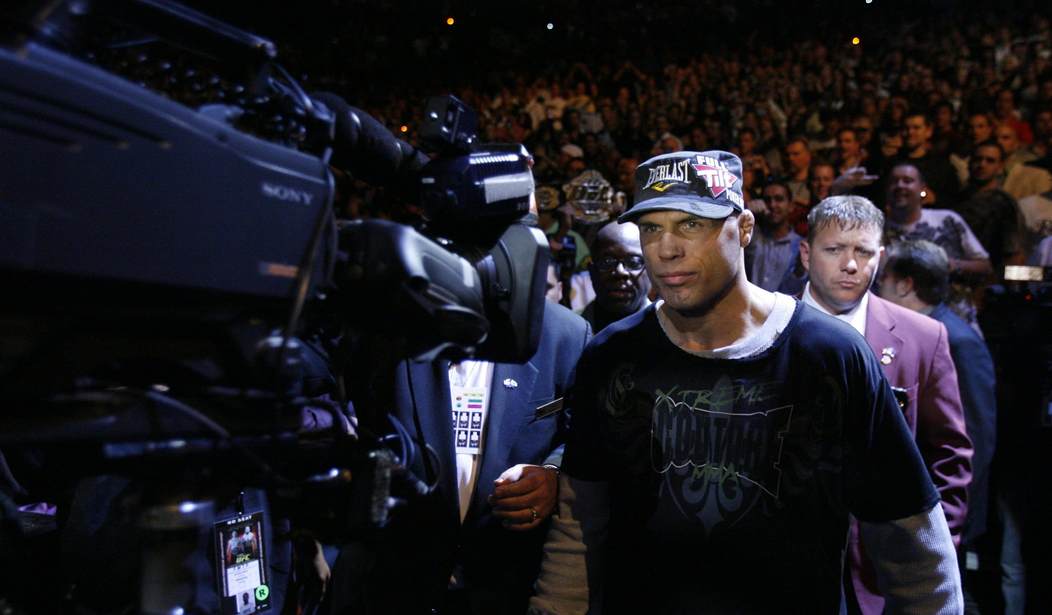WASHINGTON – A six-time mixed martial arts world champion is urging Congress to take a close look at the sport, describing to lawmakers a competition he has “come to love so much and, unfortunately, parts of the business behind it that I have come to hate just as much.”
Randy Couture, who earned titles in both the heavyweight and light heavyweight divisions sponsored by the Ultimate Fighting Championship (UFC), told members of the House Subcommittee on Commerce, Manufacturing & Trade this month that participants face general mistreatment and are being exploited at the hands of promoters and that the business requires increased oversight from federal authorities.
Unless a fighter is a star in the UFC like Ronda Rousey or Conor McGregor, Couture said, “you’re getting the shaft.”
Anyone competing below the championship level is struggling, Couture said. The UFC, operating under the trade name of Zuffa, LLC, has more than 500 fighters under contract at any given time and the corporation retains the rights to utilize the athlete’s likeness in perpetuity for all commercial purposes.
Under the terms of Zuffa contracts, Couture said, MMA champions are prevented from becoming freely marketable and secret discretionary payments are used to “keep athletes subservient and silent.” Meanwhile, those on the lower rungs are barely eking out a living.
Fighters rise based solely on the whim of the promoters, he said.
“Unlike in boxing and kickboxing, MMA promoters do not and have not been required by the athletic commissions to utilize independent or objective rankings,” Couture said. “In addition to the lack of independent rankings, MMA promoters also issue their own championship titles. To even be considered to compete for these promotional titles, athletes are required to sign exclusive, long-term contracts removing these athletes from the competitive marketplace.”
Couture appeared before the subcommittee to speak on behalf of the Muhammad Ali Expansion Act, sponsored by Rep. Markwayne Mullin (R-Okla.), himself a former MMA participant. The act seeks to extend federal protections already afforded to boxers under the Professional Boxing Safety Act of 1996 to MMA fighters.
The measure requires the Association of Boxing Commissions to establish guidelines for minimum contractual provisions that should be included in bout agreements involving mixed martial arts and set guidelines for the ranking of participants.
Mullin’s bill also applies conflict of interest provisions that prohibit a promoter from having a financial interest in the management of a boxer, or a manager from having a financial interest in the promotion of a boxer, to fighters participating in mixed martial arts.
Rep. Michael C. Burgess (R-Texas), the subcommittee chairman, noted at the outset that his panel was looking into “something Congress has not focused upon before” and that MMA is “probably a new concept to some of us.”
But MMA already is a huge, multibillion-dollar endeavor. The industry’s profile has risen from virtually unknown in the early 1990s to garnering relatively significant viewership and fan engagement over the past decade. The most recent major MMA event drew a little under 2 million viewers and around 1.5 million pay-per-view buys. It also generated about $18 million at the gate.
About half of MMA’s fan base is composed of millennials, meaning its growth prospects are positive. That most recent pay-per-view event created 14 billion social media impressions as tracked by Nielsen and the winner at the top of the fight card earned $40 million.
“That doesn’t match what a top boxing championship fight brings, but there’s no longer a doubt that MMA is ready for primetime or that it is an economic driver,” Burgess said.
UFC isn’t the only MMA organization operating in the U.S. but it is definitely the largest. Zuffa recently sold out to a group controlled by WME/IMG for a reported purchase price of $4.2 billion. That came after Zuffa in 2015 reported annual revenue in excess of $600 million, with more than 63 percent of revenue event-related. Zuffa also has entered into lucrative TV licensing deals, including a seven-year, $832 million deal with Fox and a five-year, $232 million deal for broadcast rights in Brazil.
Burgess also noted that the safety of MMA fighters “is of utmost importance.’’ Dr. Ann C. McKee, a professor of neurology and pathology at the Boston University School of Medicine, told the subcommittee that MMA fighters may face the prospect of head injuries that can become more serious as they age.
McKee said chronic traumatic encephalopathy is “a major problem” in contact sports like football and boxing “and any other sport that involves a high number of head impacts, such as mixed martial arts.”
CTE is a neurodegenerative disease triggered by repetitive head trauma that causes buildup of an abnormal protein called tau in the brain. Tau is toxic to nerve cells and causes progressive brain deterioration over time.
“The symptoms of CTE are delayed and often do not show up until the athlete has retired from the sport,” McKee said. “Once the symptoms begin, they progress and become worse as the person ages.”
Symptoms of CTE include memory loss, confusion, impulse control problems, aggression, depression, anxiety and dementia.
Thus far, McKee said, the medical community has found evidence of CTE in only one MMA fighter – a 27-year-old who committed suicide. But, she added, “there is good reason to believe that a significant portion of other MMA fighters are at risk for CTE.”
“Even though there is not much research available on the long-term consequences of MMA, we do know it has a high concussion rate and, importantly, it also has a high subconcussive impact rate.”
UCF publicly opposes and is vigorously lobbying against Mullin’s legislation. The organization sent Jeff Novitzky, vice president for Athlete Health and Performance at Ultimate Fighting Championship, to the hearing, at which he testified about the organization’s anti-doping program.








Join the conversation as a VIP Member